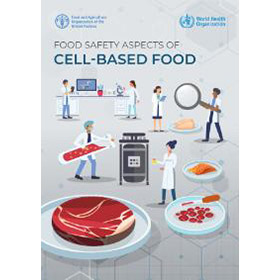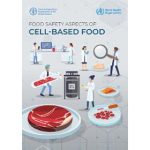As regulatory bodies in the U.S. and around the globe prepare to accept cell-based food products into their markets, a new report, Food Safety Aspects of Cell-Based Food, sheds light on potential hazards posed by this new class of foods.
Published jointly by the Food and Agriculture Organization of the United Nations (FAO) and the World Health Organization (WHO), the 146-page report includes country case studies from Israel, Qatar, Singapore, as well as findings and recommendations from a global technical panel of experts from academia and industry.
The panel identified 53 potential hazards that may be introduced during the Cell Sourcing, Cell Harvesting, Food Production and Food Processing Phases. All of which exist within traditionally produced foods, apart from:
- The potential for expression of novel toxins, toxic metabolites, or allergens or a change in expression of toxins, toxic metabolites, or allergens as a result of genomic instability, genetic or phenotypic Instability, and / or induced through physical or biochemical stimuli during cell culture.
- Physiochemical transformation of food components (i.e., altered protein structure, reactive species formation) due to food processing or storage. The panel notes that while this same hazard is present in conventionally produced food, cell-based foods may contain new inputs (e.g., scaffolds and residues) and processing ingredients that must be tested.
“Many hazards are already well-known, and they exist in conventionally produced food,” the reports reads. “For example, microbiological contamination can occur at any stages of any food production process, including those involved in producing cell-based food. The experts concluded, however, that most cases of microbial contamination during the cell growth and production stages would inhibit cell growth. If the cells have grown and reached product expectations for harvest, then occurrence of such contamination would be extremely rare during the production process, but it could occur post-harvest, as is the case with many other food products. Various existing prerequisite programmes such as good manufacturing and hygiene practices, as well as food safety management systems such as Hazard Identification and Critical Control Points (HACCP), are applicable to ensure food safety for cell-based food.”
The reports calls for additional research and funding to determine if cell-based foods could provide healthy, nutritious, and sustainable food for future generations, while reducing environmental impacts by using less land and water, emitting fewer greenhouse gases, reducing agriculture-related pollution, improving farm animal welfare and reducing the risk of zoonotic diseases that can spread from animals to humans.
Additional topics touched upon by the Technical Panel include the challenge of high production costs, the need for uniform terminology, potential regulatory frameworks for cell-based foods, and a need to further investigate consumer perception and acceptance (including taste and affordability).



